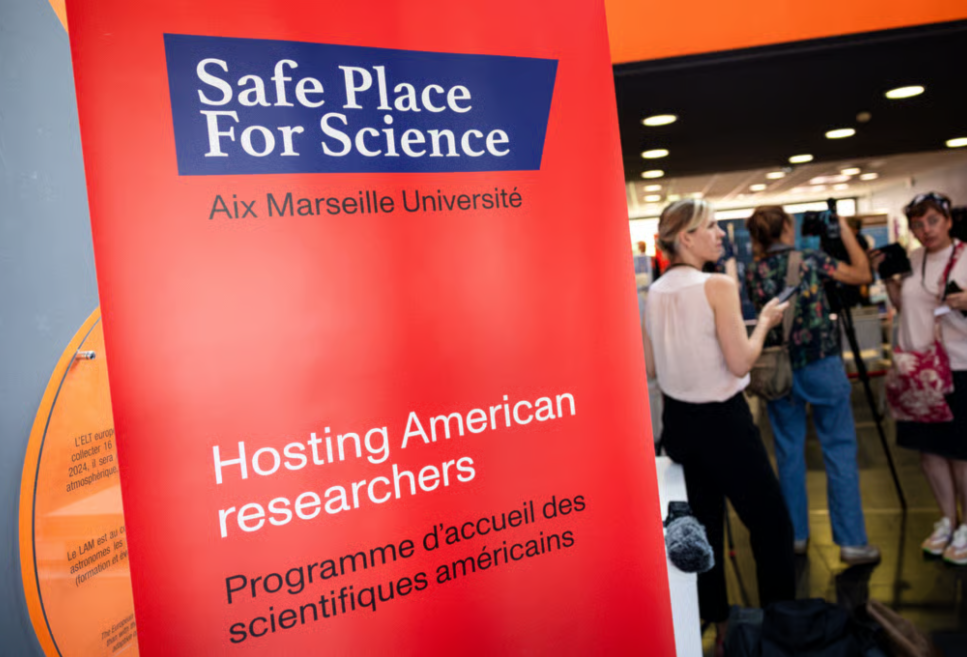First batch of American ‘scientific refugees’ arrives in France
Amid fears of funding cuts and political pressure under Trump’s presidency, US researchers have opted to flee America in pursuit of Europe, mostly.
-

A banner is seen at Aix Marseille Universitغ during a 'Safe Place for Science' program (Undated, AFP)
The first wave of American academics leaving the US under Donald Trump's presidency has arrived in France.
Last week, Aix-Marseille University (AMU) welcomed eight US-based researchers as part of its “Safe Place for Science” initiative, designed to attract scholars who face or fear funding cuts under the Trump administration. The program offers these researchers a new beginning in the sunny Mediterranean city of Marseille.
Although France and the broader European Union have each launched multimillion-euro efforts to draw scientific talent from the US since Trump took office in January, AMU’s program is the first of its kind in France. As a result, the eight scholars now settling at AMU are considered the first “academic refugees” to formally relocate to France.
Speaking from the university’s hilltop astrophysics institute, AMU President Éric Berton drew a stark historical parallel, comparing the current exodus to the flight of European academics from Nazi persecution during World War II.
“What is at play here today is not unrelated to another dark period of our history,” Berton said.
Both Berton and former French President François Hollande have advocated for the recognition of a special "scientific refugee" status to support displaced researchers.
Fleeing uncertainty at home
As many of the researchers attending President Éric Berton’s speech had yet to finalize their contracts with Aix-Marseille University (AMU), several requested anonymity to avoid jeopardizing their positions at US institutions should they decline or not be admitted to the program.
Among the applicants was James, a climate scientist at a well-regarded American university, and his wife, who specializes in the relationship between judicial systems and democracies. James explained that they applied to AMU because their fields of research are “in the crosshairs” and particularly vulnerable to political pressure and funding cuts under the Trump administration.
Though James, who asked that his last name not be used, hesitated to label himself or his peers as “refugees", he expressed serious concern about the future of academic freedom and research in the US under current leadership.
One researcher who has already made the transition is Brian Sandberg, a history professor at Northern Illinois University whose work focuses on climate patterns during the Little Ice Age (roughly the 16th to 19th centuries). Originally set to spend a year in Marseille as a visiting professor, Sandberg learned about the "Safe Place for Science" program during a workshop in the city this past March and decided to apply.
Sanberg expressed that "the entire system of research and the entire education in the United States is really under attack."
A new life, with trade-offs
Despite not having the global name recognition of its Parisian counterparts, Aix-Marseille University (AMU) has attracted nearly 300 applications, including from researchers at elite U.S. institutions like Stanford and Yale, for its “Safe Place for Science” program. AMU President Éric Berton said the volume of interest reflects the growing urgency among American academics under the Trump administration.
The university has already committed €15 million to fund the initiative and is lobbying the French government to match it, which would allow the school to expand the program’s hires from 20 to 39 researchers. Berton emphasized that participants would receive salaries equal to those of French researchers, aiming to calm domestic concerns about resources being shifted away from local academics, many of whom already face chronic underfunding.
Still, for many American applicants, the decision to move is complex. Challenges include adjusting to life in a country where English isn’t the primary language, lower academic salaries compared to the US, and reduced research funding.
One early-career biological anthropologist, for example, said she was waiting for full contract details before making a final decision, citing salary differences. However, she noted that France’s lower cost of living, along with free education for her two children, who are eager to move, makes the transition more appealing.
Ultimately, she said, a simpler, less politically charged life could outweigh financial concerns. "There’ll be a lot less stress as a whole, politically, academically."

 4 Min Read
4 Min Read








